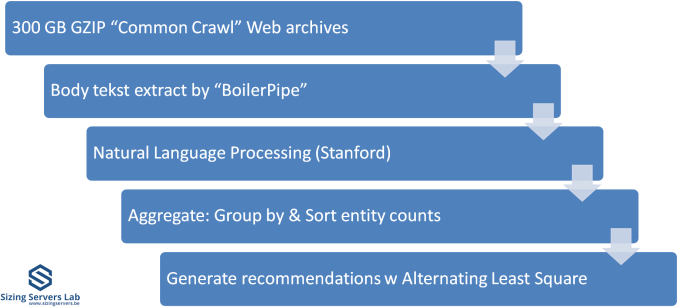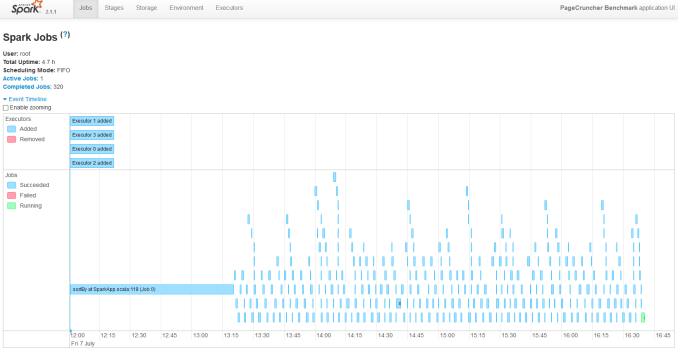Sizing Up Servers: Intel's Skylake-SP Xeon versus AMD's EPYC 7000 - The Server CPU Battle of the Decade?
by Johan De Gelas & Ian Cutress on July 11, 2017 12:15 PM EST- Posted in
- CPUs
- AMD
- Intel
- Xeon
- Enterprise
- Skylake
- Zen
- Naples
- Skylake-SP
- EPYC
Apache Spark 2.1 Benchmarking
Apache Spark is the poster child of Big Data processing. Speeding up Big Data applications is the top priority project at the university lab I work for (Sizing Servers Lab of the University College of West-Flanders), so we produced a benchmark that uses many of the Spark features and is based upon real world usage.
The test is described in the graph above. We first start with 300 GB of compressed data gathered from the CommonCrawl. These compressed files are a large amount of web archives. We decompress the data on the fly to avoid a long wait that is mostly storage related. We then extract the meaningful text data out of the archives by using the Java library "BoilerPipe". Using the Stanford CoreNLP Natural Language Processing Toolkit, we extract entities ("words that mean something") out of the text, and then count which URLs have the highest occurrence of these entities. The Alternating Least Square algorithm is then used to recommend which URLs are the most interesting for a certain subject.
In previous articles, we tested with Spark 1.5 in standalone mode (non-clustered). That worked out well enough, but we saw diminishing returns as core counts went up. In hindsight, just dumping 300 GB of compressed data in one JVM was not optimal for 30+ core systems. The high core counts of the Xeon 8176 and EPYC 7601 caused serious performance issues when we first continued to test this way. The 64 core EPYC 7601 performed like a 16-core Xeon, the Skylake-SP system with 56 cores was hardly better than a 24-core Xeon E5 v4.
So we decided to turn our newest servers into virtual clusters. Our first attempt is to run with 4 executors. Researcher Esli Heyvaert also upgraded our Spark benchmark so it could run on the latest and greatest version: Apache Spark 2.1.1.
Here are the results:

If you wonder who needs such server behemoths besides the people who virtualize a few dozen virtual machines, the answer is Big Data. Big Data crunching has an unsatisfiable hunger for – mostly integer – processing power. Even on our fastest machine, this test needs about 4 hours to finish. It is nothing less than a killer app.
Our Spark benchmark needs about 120 GB of RAM to run. The time spent on storage I/O is negligible. Data processing is very parallel, but the shuffle phases require a lot of memory interaction. The ALS phase does not scale well over many threads, but is less than 4% of the total testing time.
Given the higher clockspeed in lightly threaded and single threaded parts, the faster shuffle phase probably gives the Intel chip an edge of only about 5%.












219 Comments
View All Comments
tamalero - Tuesday, July 11, 2017 - link
How is that different if AMD ran stuff that is extremely optimized for them?Friendly0Fire - Tuesday, July 11, 2017 - link
That's kinda the point? You want to benchmark the CPUs in optimal scenarios, since that's what you'd be looking at in practice. If one CPU's weakness is eliminated by using a more recent/tweaked compiler, then it's not a weakness.coder543 - Tuesday, July 11, 2017 - link
Rather, you want to test under practical scenarios. Very few people are going to be running 17.04 on production grade servers, they will run an LTS release, which in this case is 16.04.It would be good to have benchmarks from 17.04 as another point of comparison, but given how many things they didn't have time to do just using 16.04, I can understand why they didn't use 17.04.
Santoval - Wednesday, July 12, 2017 - link
A compromise can be found by upgrading Ubuntu 16.04's outdated kernel. Ubuntu LTS releases include support for rolling HWE Stacks, which is a simple meta package for installing newer kernels compiled, modified, tested and packaged by the Ubuntu Kernel Team, and installed directly from the official Ubuntu repositories (not via a Launchpad PPA). With HWE 16.04 LTS can install up to the kernel of 18.04 LTS.I also use 16.04 LTS + HWE (it just requires installing the linux-generic-hwe-16.04 package), which currently provides the 4.8 kernel. There is even a "beta" version of HWE (the same package plus an -edge at the end) for installing the 4.10 kernel (aka the kernel of 17.04) earlier, which will normally be released next month.
I just spotted various 4.10 kernel listings after checking in Synaptic, so they must have been added very recently. After that there are two more scheduled kernel upgrades, as is shown in the following link. Of course HWE upgrades solely the kernel, it does not upgrade any application or any of the user level parts to a more recent version of Ubuntu.
https://wiki.ubuntu.com/Kernel/RollingLTSEnablemen...
CajunArson - Tuesday, July 11, 2017 - link
Considering the similarities between RyZen and Haswell (that aren't coincidental at all) you are already seeing a highly optimized set of RyZen results.But I have no problem seeing RyZen be tested with the newest distros, the only difference being that even Ubuntu 16.04 already has most of the optimizations for RyZen baked in.
coder543 - Tuesday, July 11, 2017 - link
What similarities? They're extremely different architectures. I can't think of any obvious similarities. Between the CCX model, caches being totally different layouts, the infinity fabric, Intel having better AVX-256/512 stuff (IIRC), etc.I don't think 16.04 is naturally any more optimized for Ryzen than it is for Skylake-SP.
CajunArson - Tuesday, July 11, 2017 - link
Oh please, at the core level RyZen is a blatant copy-n-paste of Haswell with the only exception being they just omitted half the AVX hardware to make their lives easier.It's so obvious that if you followed any of the developer threads for people optimizing for RyZen they say to just use the Haswell compiler optimizations that actually work better than the official RyZen optimization flags.
ddriver - Tuesday, July 11, 2017 - link
Can't tell if this post is funny or sad.CajunArson - Tuesday, July 11, 2017 - link
It's neither: It's accurate.Don't believe me? Look at the differences in performance of the holy 1800X over multiple Linux distros ranging from pretty new (OpenSuse Tumbleweed) to pretty old (Fedora 23 from 2015): http://www.phoronix.com/scan.php?page=article&...
Nowhere near the variation that we see with Skylake X since Haswell was already a solved problem long before RyZen lauched.
coder543 - Tuesday, July 11, 2017 - link
Right, of course. Ryzen is a copy-and-paste of Haswell.Don't make me laugh.